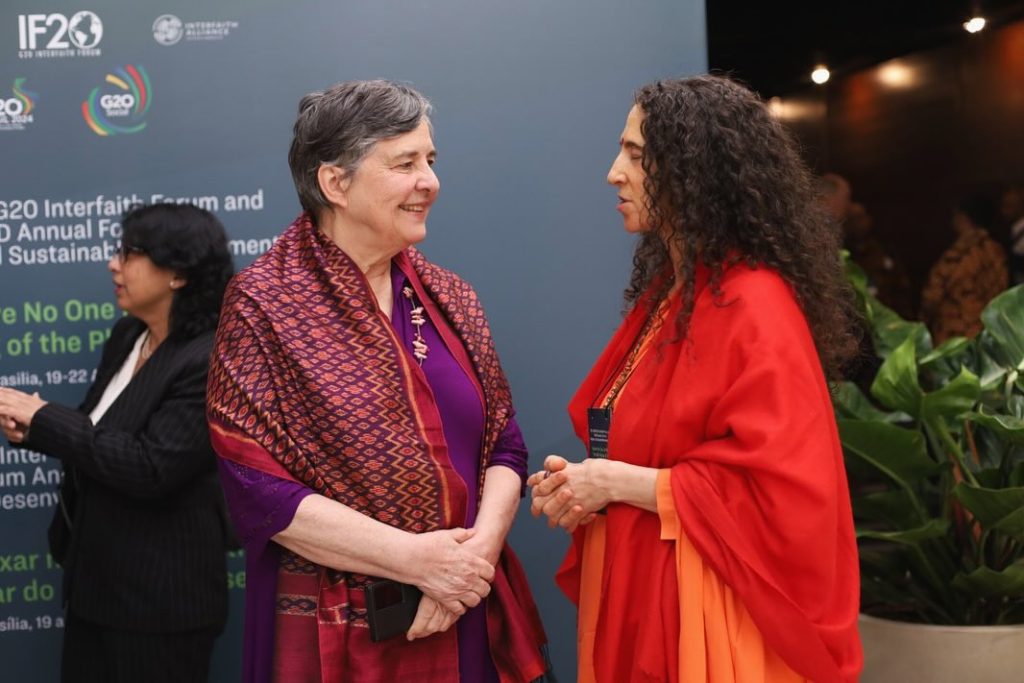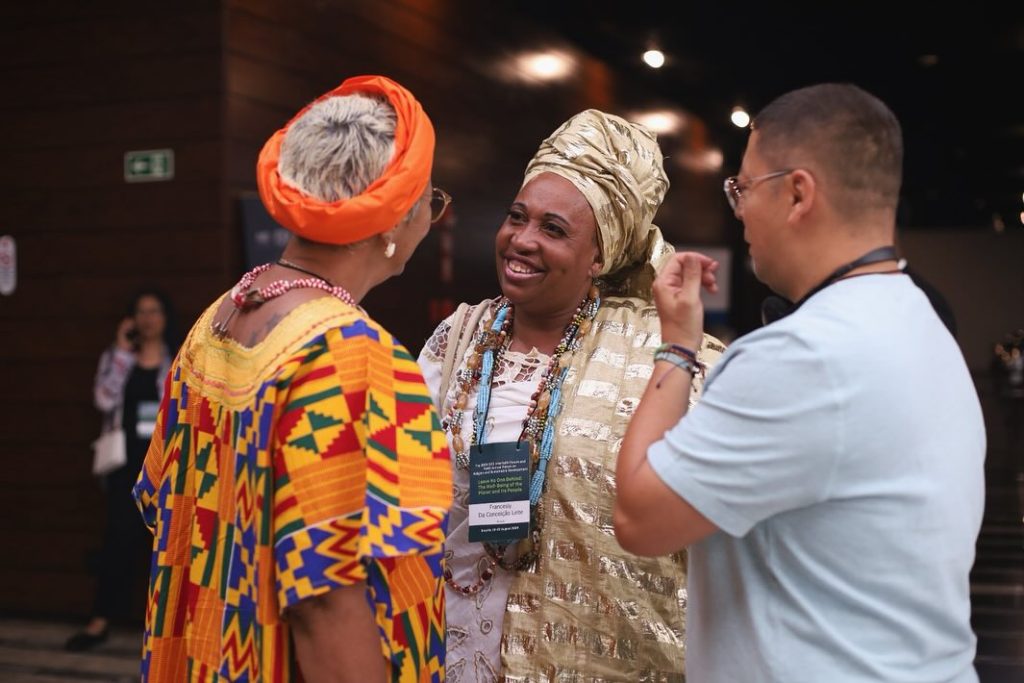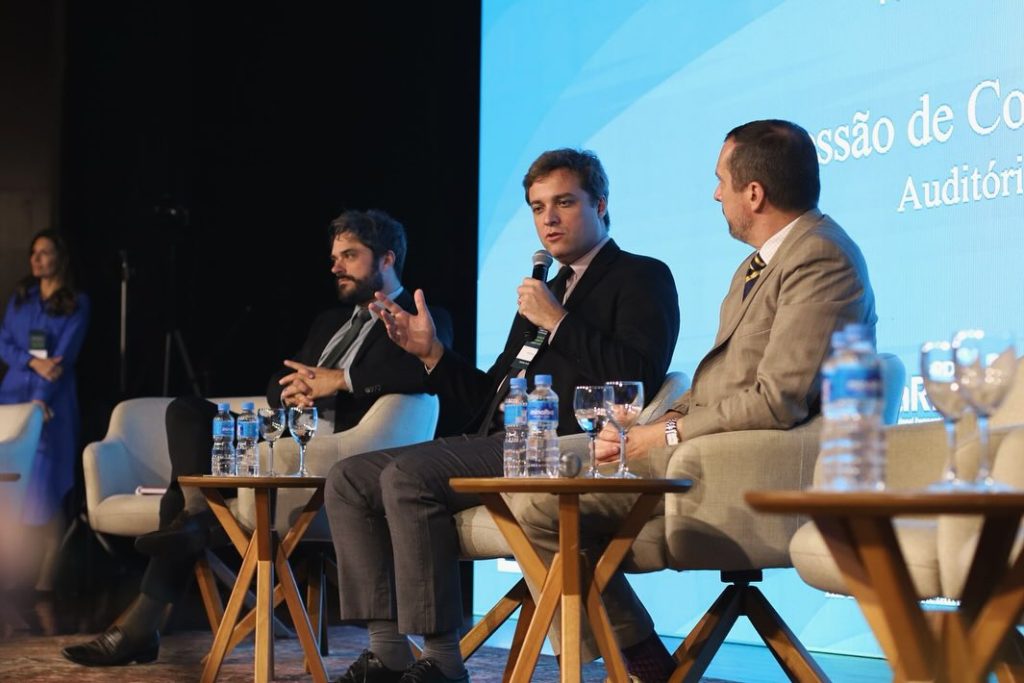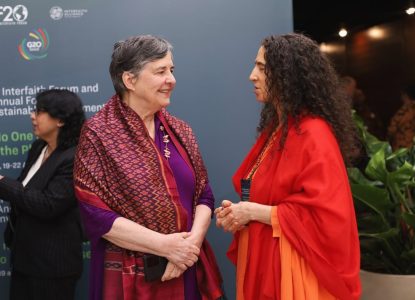By Katherine Marshall, Vice President, G20 Interfaith Association
In August, 2024, as the G20 Interfaith Forum in Brasilia drew to a close, Katherine Marshall, Vice President of the G20 Interfaith Association, delivered concluding remarks that encapsulated the key themes, achievements, and future directions of this significant gathering. This blog post summarizes Marshall’s reflections on the Forum’s outcomes, highlighting the urgent calls to action, the context of the G20, and the critical recommendations put forward by the interfaith community.
– – –
Thanks and appreciation. The teams involved, which include especially Cole Durham and Rodrigo Vittorino Alves, have devoted countless hours and creative energy to this event. We have many to thank for making this meeting a success. My colleagues at the World Faiths Development Dialogue (WFDD) and Georgetown University’s Berkley Center, largely invisible, have contributed in important ways to the substantive preparation and will be actively engaged in follow up. In sum, the team and participants have been magnificent.

Calls to action: We were called to action by Taissa, a young Indigenous girl who lives in the Amazon, who spoke during the opening plenary. Her courage in calling us to action, on behalf of her rising generation, resonated with us all. We come together and act above all on behalf of children and what is to come. Hearing their voice is vital and moving. Mary Robinson, speaking both as chair of the Elders and as an “angry granny” focused on the urgent need for action to change direction on climate change. Marina Silva, Brazil’s Minister of Environment, also spoke to urgency and seeing results in practice as our collective responsibility.
The G20 Context. A distinctive feature of the focus on the G20 is the link to power, both of mighty nations and of central authority. The G20 leaders exercise power to change direction on many global agendas, and the concentration of this power gives them and those who advise them great responsibility. They have power to make some changes almost instantaneously, for example within aspects of financial regimes and interstate relationships. Their responsibility for other vital issues, notably affecting human capabilities and development, has a longer fuse and requires collaboration and what we now call full stakeholder participation. Action and policy implementation involve resources, especially finance, a G20 focus that also shapes IF20 approaches. The reality, however, is that all have responsibilities and are part of forces of change and stagnation; for the G20 Interfaith Forum, the G20 and its complex roles are the central focus but we need always to keep.in mind a balance between central power and community realities.
Communicating with G20 leadership. I have been close enough to leaders in positions like those who represent the G20 Summit and appreciate the pressures on them, hence the vital need to take their situation and perspectives into account. The road from a global leader through national institutions, local institutions, civil society, congregations of many kinds, to communities, and families is long and bumpy, and for leaders, pressures of their roles can make daily realities especially affecting poor people fade in the distance. Our challenge is to remind and convey those realities through a prophetic voice but also through tangible, understandable, practical ideas and proposals. The learning process needs to go in both directions, and listening needs to include hearing appeals to action.
Communication has critical importance. All of us here have special roles as cultural translators, bridging and linking different perspectives and languages among the varied communities involved. Both leaders and those of us advocating or urging them to action can stay in our bubbles and to be blinded to alternative realities.
Our central responsibility and concern, woven throughout the preparations and the Forum, is to highlight those who are central to our concern: the voiceless. “Leave no one behind” is the central theme and we were reminded often that there should be “nothing about us without us”, and that a preferential option for the poor needs to be a reality.
Two faces of religion and reality. We were moved by reminders of religious diversity and complexity, through reports of lived realities and some powerful metaphors. Secularism, for example, can be a sword, that damages and destroys, or a shield, a powerful force of protection. Our goal is to “accentuate the positive”.
Brazilian participation from beginning to end was a hallmark of the experience. It enriched every part of the event and allowed us to learn and challenge ideas with lived experience.
IF20 2024 Recommendations. As the Forum’s began, we highlighted the difficult winnowing process that led to our focus on five vital areas. The Forum has addressed myriad issues and latter discussions opened still more. Their interconnections in today’s dynamic societies complicates the task further. We honor and appreciate these diverse priorities and perspectives and will follow up on the many interconnected issues that are part of today’s mega and perma crises.

The recommendation process began with a brief one page summary of 2024 G20 Interfaith recommendations, with backup of each of the five focus areas reflected in briefs (all on the website). There are also briefs on several other areas including post COVID19 actions, climate finance, and racism. We welcome feedback on each topic, and plan a webinar on each of the five focus topics in the weeks ahead. Analysis and action, carried to G20 member countries as well as the Brazilian G20 hosts, will be a focus at the November Social Summit. These topics demand continued focus and we plan to pursue these and other topics into the future.
Poverty and hunger: The Forum was fired by the cause of poverty and food insecurity. The call to be part of the new Alliance against Hunger resonates with central religious teachings. The aim is to join forces with the Alliance leaders as a central stakeholder. Advocacy and accountability are two important faith contributions but so are the myriad actions by communities worldwide: soup kitchens, modeling constructive behaviors, supporting smallholder agriculture and countless other areas of action.
Aspects of global governance also call us to active participation in global alliances, for example those focused on debt restructuring, reforms of global tax regimes, and climate finance. We look to strong advocacy, action to hold leaders to account for implementation at many levels, and faith contributions to the broad objectives. Supporting vital lifesaving humanitarian action is central to this focus on global systems of social protection that look to addressing inequalities and poverty. These are at the heart of the G20 mandate.
The climate and ecological crisis called us all throughout the Brasilia Forum to urgent action—from Taissa’s call to Bartholomeo, the Ecumenical Patriarch, and each particiant. The many dimensions of the crisis include prominently the tropical rainforests where the Interfaith Rainforest Initiative exemplifies the collaborative and inspirational approaches we seek. IRI brings different religious traditions together, and includes in integral ways Indigenous communities (recognizing their vital roles, with governments, business, civil society, and other stakeholders.

Education for Social cohesion and harmony. Religious literacy and aspects of education systems that address pluralism are not prominent on G20 agendas but they should be. The inspirational examples of the Indonesian Cross Cultural Religious Literacy program, with its focus on teachers and messages of competencies and respect, and Arigatou International’s bold longstanding approach to ethics education for children offer inspiration. We need strong models to highlight the vital importance of leadership to benefit from the world’s rich and increasingly plural societies and to address intergroup tensions that are sadly on the rise.
Trafficking in persons and modern slavery are longstanding G20 Interfaith Forum areas of focus. For 2024 we urge practical action to take the ideas and calls for action to a new level, with a working group and calendar for reporting and accountability. The G20 Interfaith Forum proposed active support, including putting financial numbers and other actions to calls for stepped up action.
We look forward to active participation in the Social Summit and to learning about and addressing the 2025 G20 agenda, with South Africa taking on the presidency on December 1.
– – –
Katherine Marshall is a senior fellow at the Berkley Center for Religion, Peace, and World Affairs at Georgetown University. She serves as the vice president of the G20 Interfaith Association and executive director of the World Faiths Development Dialogue. With over three decades of experience at the World Bank, Marshall has been at the forefront of addressing development issues in the world’s poorest countries, with a particular focus on the intersection of religion and global development.


